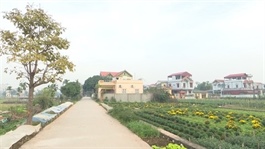Sunnier days anticipated through updated land laws
Sunnier days anticipated through updated land laws
The proposal to implement the revised Land Law from July instead of next year is expected to bring confidence to the real estate sector.

Initially, the law was set to take effect in early January 2025, but they have been recommended to start on July 1. The law revises and supplements policies to remove obstacles in land management and use, creating conditions for the real estate market to grow.
At the same time, it also adds policies on land recovery, compensation, and resettlement, removing the land price framework and regulating the annual land price list to approach market prices.
Dr. Nguyen Quang Tuyen from Hanoi Law University said that if the laws were implemented sooner than planned, they would have a very positive impact on the market.
“The revised law will support economic organisations and investors’ access to the land market and be much more open with regulations that create better conditions for overseas Vietnamese to buy houses and land like domestic citizens,” Tuyen told VIR.
He added that the Real Estate Business Law, meanwhile, would help remove obstacles and purify the market with regulations controlling brokerage and transactions, while the Housing Law would help to increase access to housing. Both laws are expected to follow the land law into being next year.
“However, all laws will need time to be understood alongside new policies. To ensure effective implementation, it is necessary to improve the dissemination of information and the implementation and application capacity of local management agencies,” Tuyen added.
Meanwhile, Nguyen Thanh Chung, a representative from the Vietnam Association of Realtors, said that the property market could quickly return to a normal state when the laws take effect.
“They will help the market become increasingly transparent for all participating economic sectors and, at the same time, they will help increase supply, especially social and affordable housing, reinforced by economic growth and strong urbanisation,” Chung said. “Up to now, the number of investors willing to return to the market has increased in the context of more projects being opened for sale and introduced to the market.”
Real estate expert Tran Khanh Quang said, “The Land Law has always been considered the central law, with profound influence on the housing and real estate business laws. Therefore, early application will create a solid foundation for the remaining laws to maximise their effectiveness,” Quang said.
In addition, important reforms on planning, land acquisition, land leasing, and calculating land use fees or in site clearance and compensation are expected to push the process of many projects, he added. This will help increase supply to the market.
“The real estate market will grow if the laws take effect sooner. But the market will not flare up like in previous years, but develop in a stable manner. Better control of investment activities and brokerage services also help the market become transparent, fair, and sustainable,” Quang said.
Currently, ministries and sectors are making efforts to complete and submit the July proposal to the government for consideration, alongside more than 20 decrees and circulars detailing and guiding the implementation of relevant laws for uniform implementation and to avoid overlap.
Individuals and enterprises should be active in researching the revised laws in order to be ready for implementation, Quang added.
























